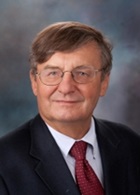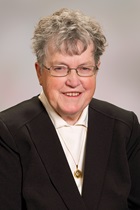ASH Honors Josef T Prchal MD and Sherrill J Slichter MD with 2017 Henry M Stratton Medal
(WASHINGTON, August 24, 2017) – The American Society of Hematology (ASH) will recognize Josef T. Prchal, MD, of the University of Utah, and Sherrill J. Slichter, MD, of Bloodworks Northwest and the University of Washington, with the 2017 Henry M. Stratton Medal for their seminal contributions in the areas of basic and clinical/translational hematology research, respectively.
The Henry M. Stratton Medal is named after the late Henry Maurice Stratton, co-founder of Grune and Stratton, the medical publishing house that first published ASH’s journal Blood. The prize honors two senior investigators whose contributions to both basic and clinical/translational hematology research are well recognized and have taken place over a period of several years. Drs. Prchal and Slichter will accept their awards on Tuesday, December 12, during the 59th ASH Annual Meeting and Exposition in Atlanta.

Dr. Prchal, the recipient of the 2017 Henry M. Stratton Medal for Basic Science, is a Professor of Medicine in Hematology, Pathology, and Genetics at the University of Utah in Salt Lake City. During the last 40 years, he has made original and lasting scientific contributions to the study of a broad range of red cell disorders. In particular, he is highly regarded for his research on disorders of increased red cell mass, including primary erythrocytosis/polycythemia, as well as inherited and acquired forms of both secondary erythrocytosis and polycythemia vera. Dr. Prchal’s research has contributed substantially to the fundamental understanding of the genetic basis of both primary and secondary polycythemias. His laboratory described the VHL mutation in recessive Chuvash familial polycythemia and elaborated on the pathobiology of EPOR mutations in autosomal dominant familial polycythemia. His genetic investigations of acquired polycythemia vera led to the association of chromosome 9p abnormalities with the disease. More recently, he and his collaborators showed that Tibetans are protected from high altitude polycythemia as a result of a high altitude genetic adaptation, due to variants of the EGLN1 gene and EPAS1 haplotype.
Dr. Prchal earned his medical degree from Charles University in Prague, Czech Republic, in 1968. He completed his residency in internal medicine at Toronto General Hospital in 1972, his hematology fellowship at Toronto General and Sunnybrook Hospital in 1975, and a research fellowship with Ernest Beutler at the City of Hope Medical Center in Duarte, California. He began his academic career at the University of Toronto in 1974.
Dr. Prchal has been a longstanding member of ASH, serving on the editorial boards for both Blood and The Hematologist, as well as various committees, including as co-chair of the Education Program for the 2003 ASH Annual Meeting. In addition to his dedicated volunteerism with ASH, Dr. Prchal served as the associate editor of Williams Hematology and Williams Manual (seventh, eighth, and ninth editions), consulting editor of The Journal of Clinical Investigation, and has authored several UpToDate chapters. In addition to the Henry M. Stratton medal, his other most distinguished awards include the American Cancer Society Scholar Award, the Anniversary Medal of Charles University for Outstanding Research Accomplishments, and an honorary doctorate at Palacky University in Olomouc (Alma Mater of Gregor Mendel).

Dr. Slichter, the recipient of the 2017 Henry M. Stratton Medal for Clinical/Translational Science, is a Professor of Medicine/Hematology at the University of Washington and Director of Platelet Transfusion Research at Bloodworks Northwest in Seattle. Dr. Slichter’s major contributions to the field of transfusion medicine over 45 years have revolutionized platelet transfusion therapy. She has identified methods to significantly prolong the shelf life of platelets, determined approaches to prevent alloimmune platelet refractoriness, identified the minimum number of platelets required to maintain hemostasis, and provided insights into understanding platelet production and viability. These long-term studies have established and improved state of the art practice in transfusion medicine.
After earning her medical degree from George Washington University in the Washington, DC, Dr. Slichter completed her residency at Parkland Hospital in Dallas. She went on to complete her fellowship in hematology and oncology at the University of Washington in 1968, and performed her extensive platelet research at Bloodworks (formerly Puget Sound Blood Center). She is currently a Professor of Medicine in the Division of Hematology at the University of Washington School of Medicine. In 2017, Bloodworks published Dr. Slichter’s autobiography (Path of Persistence: Gender Trailblazer and Platelet Pioneer).
Beyond her contributions to transfusion medicine, Dr. Slichter has been an active member of ASH through committee participation and leadership and has made numerous presentations at ASH meetings. She has been honored with many awards including the Karl Landsteiner Memorial Award from the American Association of Blood Banks, the James Blundell Award from the British Blood Transfusion Society, Richard J. Davey Lectureship Award from the National Institutes of Health, the Presidential Award by the International Society of Blood Transfusion, and the Herbert Perkins Scientific Lecture Award by the California Blood Bank Society.
“I am honored to present the Henry M. Stratton Medal to Drs. Prchal and Slichter for their exceptional commitment to research and clinical care in the areas of red cell disorders and transfusion medicine,” said ASH President Kenneth C. Anderson, MD, of the Lebow Institute for Myeloma Therapeutics and Jerome Lipper Myeloma Center at Dana-Farber Cancer Institute in Boston. “Their lifelong determination, dedication, and major contributions to hematology have already and will continue to revolutionize our field.”
The American Society of Hematology (www.hematology.org) is the world’s largest professional society of hematologists dedicated to furthering the understanding, diagnosis, treatment, and prevention of disorders affecting the blood. For more than 50 years, the Society has led the development of hematology as a discipline by promoting research, patient care, education, training, and advocacy in hematology. ASH publishes Blood (www.bloodjournal.org), the most cited peer-reviewed publication in the field, which is available weekly in print and online. In 2016, ASH launched Blood Advances (www.bloodadvances.org), an online, peer-reviewed open-access journal.
CONTACT:
Sara Khalaf, American Society of Hematology
[email protected]; 202-552-4925